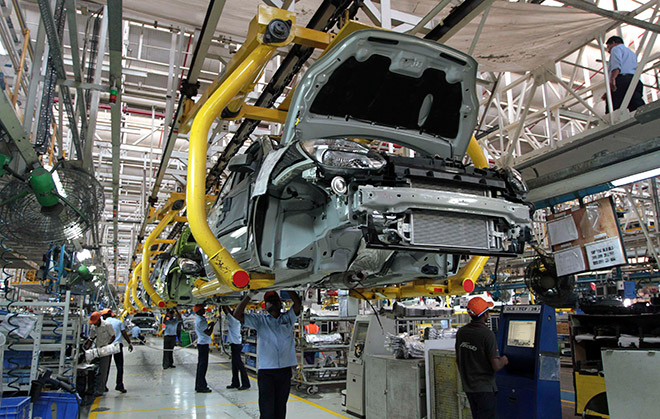The Automotive sector will play an important role in developing required capacities and capabilities of the Malaysian workforce, in line with Industry 4.0, according to Minister of International Trade, Datuk Darell Leiking. “The automotive sector has long been Malaysia’s catalyst towards creating a critical mass of knowledge workers and skilled labour, as they provide the necessary talent development space in the areas of science, engineering, technology and related technical fields”, the Minister said.
Datuk Darell further explained that the automotive value chain comprises many job functions that provide ample opportunity for high skilled jobs to flourish, such as automotive styling and design, engineering services, manufacturing processes and after sales activities. Countries such as Japan and Korea have successfully transitioned into technological powerhouses in various industries and sectors, through the technical spinoff that were sparked through the continuous support for a local automotive industry.
As at 31st May 2019, the number of documented foreign workers across all sectors amounts up to around 2 million, with 717927 in the manufacturing sector alone. This makes up about 34% of the total foreign workers in Malaysia and is the highest among other sectors. According to the Malaysia Automotive, Robotics and IoT Institute (MARii), the automotive industry employs more than 700,000 people, in both manufacturing and aftersales. In 2018 alone, 59,010 new jobs were created within the sector, with more than 5,000 people trained through programmes undertaken by the agency under the purview of MITI.
“The common perception among businesses is the preference to hire foreign workers, as their demand for wages is lower in comparison to the demand from local workers. However, this is highly debatable, as government regulations in hiring employing foreign workers such as visa application, levies and security bonds add more cost to overheads.” “With the advent of Industry 4.0, the automotive sector is evolving into an ecosystem of smart manufacturing, placing a premium on skills in automated processes, which include elements of robotics, automated guided vehicles, 3D printing, and more”, said Datuk Darell.
Datuk Darell further explained that as the sector moves towards maturation in the adoption of automation, robotics and Industry 4.0-related technologies, even more job opportunities will arise and will need to be filled with talent equipped with higher skills. These jobs should be taken up by Malaysians due to longer term career requirements, and have graduated through skilled based education. “While the issue of career enhancement, employee development and foreign worker substitution remain an issue that must be addressed holistically as a nation, it should begin with a shift in the mindsets of both employers and the labour force in fulfilling current needs of the industry and future proofing the ecosystem towards Industry 4.0.” New programmes are currently developed to address the emerging industry demands for Industry 4.0 capabilities, such as the soon to be launched Industry-Led Professional Certificate – Industry4WRD (IPC-Industry4WRD), structured to introduce high-value and skilled workers for the industry. “While the government, together with its agencies, is working closely with numerous parties towards creating new talent for the automotive sector, I urge all stakeholders to either participate or work with us in the continuous improvement of programmes that allow skills based careers to flourish within the Malaysian economy.” “Companies within the automotive value chain should participate in readiness assessment and intervention programmes that have been structured through the National Policy for Industry 4.0 (Industry4WRD), and work towards creating the space for new Malaysian talent to elevate the competitiveness of the automotive sector as a whole”, concluded Datuk Darell.




















